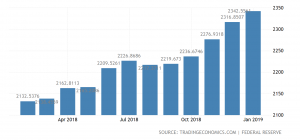Commercial mortgage is typically a loan that you get for your business in order to purchase or acquire a commercial property.
Compared to residential mortgage, it differs in several ways;
- The loan to value ratio may be higher for a residential mortgage than commercial mortgage.
- The interest rate on residential mortgage is also lower than that of commercial mortgage.
A mortgage rate is always the rate of interest you are charged on a mortgage. Hence commercial mortgage rate, is the rate on a loan you get for your business to buy a commercial property. These rates are determined and terms dictated by the lender. However, there may be regulations put in place to guide your lender on the terms and conditions they dictate. These rates can be variable (always fluctuating) or they can be fixed, meaning that same terms of the rate of interest stay the same for the terms of the mortgage. Commercial mortgage loans are at an all-time high according to Trading Economics.
“Commercial mortgage loans to the private sector in the United States averaged 595.68 USD Billion from 1950 until 2019, reaching an all time high of 2342.56 USD Billion in January of 2019 and a record low of 13.65 USD Billion in January of 1950.”

Factors affecting commercial mortgage rates.
- The economic growth.
When there is significant economic growth, that is, higher rates of employment and an increase in Gross Domestic Products (GDP), there will be an increase in income and more consumers will be in need of mortgage loans. Due to this increase in demand, the lenders will tend to increase their mortgage rates since the number of people who can afford also increases. But when the growth is slow, weakening the economy, demand will decrease. Similarly, this may force the lenders to revise their mortgage rates downwards.
- Inflation.
Inflation causes the erosion of a currency’s purchasing power over time. Therefore the gradual rise of prices due to inflation in an economy is a very important factor for mortgage lenders to consider. The lenders therefore are left with no choice but to raise their mortgage rates to a level which is at least high enough to withstand or overcome the erosion of the purchasing power caused by inflation. This, is meant to ensure that a real net profit of their mortgage interest return is represented.
- Credit Score.
The credit score that you possess is one of the factors that can greatly affect the mortgage interest rate you are charged by the lender. Typically, the consumers with lower credit scores will have higher interest rates as compared to those with higher credit scores. The credit scores are therefore used by the lenders in trying to predict how reliable you will be in paying back your loan. Credit report information is what is used in calculating the credit scores. This makes it every necessary to always review your credit reports by checking your credit for an error that may exist. In case of any error, it is always advisable to report to the company. Otherwise, an error on your credit report can lead to a lower score, which interns prevents you from qualifying for your mortgage rate that is favorable. It is advisable though, to be checking your credit report early since correcting errors on your credit reports may take a long time.
- Loan Term.
The duration or term of your loan is the time it will take you to repay the loan borrowed. Short term loans tend to have low interest rates with low overall costs, but the monthly payments are relatively higher.
- Down payment.
When you make a larger down payment, generally, this means a lower interest rates. This is so since the commercial mortgage lenders sees a lower risk level when you put more stake into the property. However, if you are unable to make a down payment of about 20% or more, the lenders will usually require you to purchase a mortgage insurance, this is sometimes called a private mortgage insurance (PMI).
- Loan amount.
It is possible for lenders to demand higher interest for a certain limit of large amounts of loans. If you are borrowing large amount of money, it is highly likely that your income is high, the lender uses this argument to charge higher mortgage interest in such scenarios.
The importance of commercial mortgage rates.
- Commercial mortgage rates are important in that they offer lowest interest rate of all loan options, this enables you as the business owner to access an important funding and at the same time maintaining lower overhead costs.
- The rates are well suited for long term loans hence allows you to pay back slowly while at the same time you work to increase your business profits.
- They are well suited for large sums of money enabling you to cover bulk of the capital costs with a single loan.
- They are applied on commercial loans which are often unsecured, hence you do not need to provide collateral to get the loan.
- They are applied on commercial mortgage loans which enables you maintain absolute ownership of your business or company. Unlike other venture capital investments which always require you to sign over a certain percentage of your company to the investors.
- The lower rates of the commercial mortgage loans gives a very cost effective loan option for people owning businesses. Though being eligible can always be a challenge, this loan option is always suitable for getting capital for your business venture.
What you can expect to pay for your commercial mortgage.
When it comes to the amount of commercial mortgage interest you are likely to pay, the higher the risk the higher the rates. For an owner occupied commercial loan, the rates can vary from about 2.2% and go up to around 18%. However, most loans generally comes in between 2.7% and 7%. But for commercial investment mortgage loans, the rates comes in at slightly higher rates. An application which is strong can come at a rate of about 2.8% and even lower. The majority of these loans however will have their mortgage rates at about 3.5% and 6%. For the case of investment properties, it tends to present a higher risk to the commercial mortgage lenders, consequently, there is an increase in the mortgage rates.
How commercial mortgage rates are calculated.
When considering the amount of commercial mortgage rates, there are some factors that the lenders are likely to consider when doing the calculations (to determine the interest rate).
These includes:
- Valuation fee.
- The broker fee.
- The lender arrangement fee
- The legal fee
- Valuation fee.
Lenders (Commercial mortgage lenders) often insist that a property is valued by one of their valuers, This is different from the residential mortgage where the fee is always not payable upfront. For residential mortgage, generally it is paid once an offer subject to evaluation has been issued. However, for commercial mortgage, the client is often given payment options for evaluation fee late in the process to ensure everything is fully agreed on before you start paying out. This minimizes the risk of you wasting money. Due to complex evaluation of the commercial mortgages compared to residential, rates considered with regards to this factor will be higher.
- The Broker fee
To arrange for commercial mortgages, brokers involved often charge a fee of 1% and sometimes even more. Some brokers however do not charge fee on certain amounts, provided they are to be paid by the lenders.
- Lender arrangement fee
When the lender arrange the loan, they will charge a fee which is called the lender arrangement fee. This is fee on the loan and usually between 0.75% to about 2.5% depending on the amount the lender gives you.
- Legal fee.
Since the applications for commercial mortgages are complex than their residential counterparts, the legal fee incurred is always higher. Commercial mortgage lenders often require different legal representation whose fee is payed for by you who is borrowing the money.
How bank rates affect commercial mortgages.
- High commercial mortgage bank rates.
The high mortgage rates by the bank is a double edged sword. Even though the bank might get higher return per person due to an increase in rate, the net profit might not be high after all since many people may shy away from getting these loans. This is due to the difficulty they may have in servicing a loan with high rates.
- Low commercial mortgage bank rates.
Just like high mortgage rates, low rates also come with its advantages and disadvantages. Too low commercial mortgage rate will result in more clients wanting loans, however, this may come with low profits since the amount gotten per client would be very small.
- Moderate commercial mortgage bank rates.
This may be the ideal rate for commercial mortgage lenders. Though the figures may vary from bank to bank, getting a value not too high and not too low will be the best for business. This will be the case since many clients will be able to afford the loans and at the same time getting reasonable amount per client, hence maximizing on the profits.
Commercial loan sample costs.
The commercial mortgage sample cost gives a general picture on how much you will be required to pay for your purchase:
-9%-35% average down payment
-$400-$1500 average fee for application.
-The appraisal (quality control) cost is usually between $1000-$5000.
-10 to 20 years typical terms of repayment.
If this resonates with you, contacting us is easy. Start your loan application by calling us today at 866-647-1650 to speak directly to a Clopton Capital Loan Officer or simply fill out the “Contact us” form. Either way, you will soon be on the road to quickly and precisely knowing your options in line with your financial needs.







